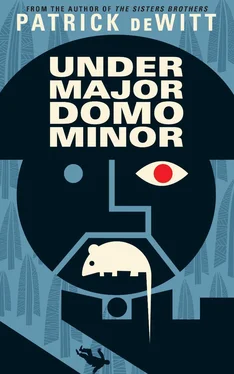Lucy thought he noticed, then was sure he did, that the Count was watching Klara each time she entered the room. At the start he did this only in stolen snatches, but as the evening progressed his attentions became more overt, so that whenever she came near he made it a point to initiate some slight contact — to touch her wrist when she took up his empty plate, or to stroke her back as she passed by. When he touched her, she froze, and her face was empty, plain; but Lucy knew she was oppressed by the Count’s attentions, and each time it occurred, his stomach pitched. At one point, when Klara had left for the scullery, the Count asked the Baron, “Where did you find that one?”
“Oh, she’s just a village girl.”
The Count found this fascinating. “So she’s not in your employ?”
“Not typically, no. But we hadn’t the time to hire full staff, and so we’re just getting by in the meantime. Why do you ask? Are you unhappy with her?”
“Quite the opposite!”
“My husband is enamoured, I think,” the Countess explained.
“Ah,” said the Baron, nodding. “Well, one could hardly blame you. Though I think you may have some competition in young Lucy, here.”
The group turned to stare at Lucy, who had been standing at the rear of the room, mutely seething.
“Is that a fact?” said the Count.
“See how he draws up when she comes near,” said the Baron, smiling fondly at Lucy. “Take note of the forlorn look in his eye when she departs. Obviously he has given himself over to her, heart and soul.” He laid his hand on the Baroness’s. “It is something which only one in love could identify.”
The Count was watching Lucy. “Well, lad, how about it? Sabres at dawn?”
He was merely making sport, and yet there was an undercurrent of true violence at play as well. You had but to look at the man to see he’d never in his life asked twice for anything he desired. What would it feel like, Lucy wondered, to push a blade into a person? Would it be quick, as when you sliced your hand through a ray of light, or slow, and heavy, like an oar through water? Either way, at that moment he really did want to run this Count through, and so in reply to the query he said, “At dawn, by the light of the moon — just as you wish, sir.”
The celebrants thought this very fine, and they laughed a long while about it. The Baron himself stood and saluted Lucy, and the Baroness clapped her white gloves in his direction. Lucy bowed to the group and left the dining room to find Klara standing on the other side of the door, flushed and beaming, for she had been eavesdropping, and had heard Lucy’s response to the Count’s challenge. Lucy was taken up by an uncommon boldness, and he kissed her there, listening to the swish of her uniform against her skin. A moment of this, and she stepped back, watching him with a look of wonderment. A nameless resolution formed in her eyes, then she led him by the hand, away from the dining room and into the cavernous space of the ballroom, closing the door behind them.
She was not shy, which made him feel shy. She had pressed him against the far wall of the ballroom, and as she undid his trousers Lucy studied her with an idolization so vast it took on physical properties in his heart; the size and weight of it was frightening for him in that he felt he could not contain it. At certain moments in their coupling she became feverish, and it seemed to Lucy she was not herself at all, but possessed by some spirit he hadn’t yet known. He gripped her skull and marvelled at its diminutive delicacy, puzzling over how it could be that so frail a vessel might possess such a force as Klara possessed. At the apex of his passion his body was flooded in light. Lucy had never been so moved.
Klara stood and corrected herself, straightening the hem of her dress with a sensible tug of the wrists. She was smiling with sly pride, and she told him, “I’ll go first.” Lucy nodded but didn’t answer. After she had gone he remained leaning against the wall, legs atremble, trousers still bunched at his ankles. What an eventful day I’m having, he thought.
This sentiment was compounded when the doors swung open and the partygoers entered in a hysterical troupe. Lucy slipped crabwise to stand behind the curtain at his right; he could think of no way to pull up his trousers without bringing attention to his person, and so was forced to leave them be. He stood for a time in the darkness behind the heavy fabric but soon folded back the edge of the curtain, that he might catch a glimpse of the group; and it was from this vantage point that Lucy could and did witness and catalogue the strange and terrible ballroom goings-on. All were present save for the Count, who some moments later scampered into the room, the tart wrapped up in his arms like a swaddled infant, his face descriptive of a perceived immortality.
“Look at how merry he is,” said the Countess.
“Remarkably so,” the Duchess commented.
“Can one be too merry, I wonder?” asked the Baroness.
“One can not,” the Count announced, resting the tart atop the table. “For joy carries no consequence, and is desirous of nothing save for more joy.” As the group digested the statement, the Count stood by, admiring the dessert, smiling sleepily, the picture of satisfied docility. But then some black violence or another occurred in his mind, and a look of cruelty came over him. He punched his fist dead into the centre of the virgin tart.
The Strange and Terrible Ballroom Goings-On
The Count, in his negligence, as if to intentionally cultivate his negligence, was eating the tart from the cup of his palm, with all the aplomb of a hog lapping slop. Clenching his hand to a fist, he watched the remainder push between his fingers, watched the drabs fall to the floor; he wiped his palm on his trouser leg and regarded the assembled group with glazed eyes. Said the Baron to the Baroness, “Our guest is happy with the tart, my love.”
“It would seem so,” said the Baroness.
“And if he is happy, then we are happy also, isn’t that right?”
“We most certainly are.”
“For what is the function of the host, after all?”
She spoke as one performing elocution: “The function of the host is to ensure the comfort and amusement of his guests.”
He patted her hand, and they shared a look of wholesome admiration. Now the Baron addressed the others. “I wonder if the rest of our friends are as well pleased as the Count?”
The Duke said, “I’m feeling very well, myself.” He turned to his wife. “Is there anything you’re in need of, dear?”
The Duchess shook her head emphatically.
“Nothing at all?”
She continued shaking her head, and smiling — it seemed she was too intoxicated to speak. In fact, all in the group were by this point thoroughly drunken, their cheeks aglow with wine and good cheer; it was quite natural that they should, in spite of their societal positions, abandon formalities. Still, it was troubling to Lucy that the Count, presently grinding the tart droppings into the carpet with his spat-covered boot, should behave in such a way and receive nothing in the way of reprimand; for surely he had crossed the line which separates the ready celebrant from the boor. And so Lucy was pleased when the Countess spoke up from her perch on the settee, saying, “Oh, but you’re making a mess of it. Don’t you see that you’ll spoil it for the others?”
The Count ceased grinding the tart. He was staring at the Countess. She ran her finger along the lip of her glass, regretful of having spoken up, apparently. “Well, I’m sorry,” she said, “but it did seem to me you were ruining the dessert for the rest of us, after all.”
His gaze drifted away, and across the room, as though he were taking in the furnishings. An awed expression appeared on his face; one would have thought some profound knowledge had arrived at the forefront of his mind. Regarding the tart, then, he took up yet another handful and crossed over to the Countess, walking with the deliberate steps of a man who was compromised by drink but focusing with all his might on purposeful movement. Standing before his wife, he held his tart-dripping fist out between them. His breathing was erratic.
Читать дальше












